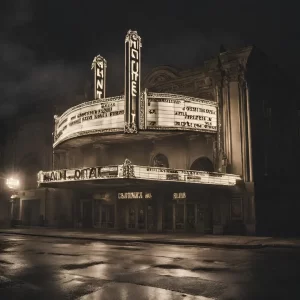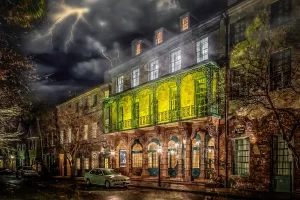Charleston’s Haunted Theatre Scene

Charleston, South Carolina, one of the most historically significant cities in the United States, is said to be one of the most haunted. The Holy City, as it is sometimes called, was integral in the Revolutionary and Civil Wars and was one of the first successful British colonies in North America.
The most populated city in South Carolina is filled with more than just the living. Ghost hunters and paranormal investigators flock to this city every year, and travel magazines and otherworldly experts consistently rank it among the country’s top ten most haunted cities.
Somewhere between history and hauntings lies Charleston’s theater scene. Through plagues, wars, and the passage of time, Charleston has maintained the arts of stage and cinema, with an impressive history of movies and playhouses. Every so often, spirits from the past bleed into today’s reality, and just like the living, sometimes even the dead want to go to the theater.
Dock Street Theater

Said to be the first theater in America, the Dock Street Theater opened in 1736 in Charleston, South Carolina. In 1740, however, a fire destroyed much of the city, including the theater. Almost seventy years later, in 1809, a hotel was built at the same site. Built by the Calder family and named the Planter’s Hotel after the Planter family that came to stay every horse racing season. For almost sixty years, the people of Charleston came to Dock Street for the best entertainment the South could offer.
After the Civil War, the theater fell into disrepair, and a year after the war ended (1886), an earthquake rocked Charleston to its core. It was then left abandoned for almost fifty years. During the Great Depression, it became a WPA project and created jobs for many Charlestonians. Eventually, the hotel owners opened a new theater, kept the name Dock Street, and even used part of the original theater to construct the new one.
The Dock Street Theater had some notable employees over the years. Civil War Naval hero and later US Congressman Robert Small started as a waiter in the Planter’s Hotel. Most notable was British stage actor Junious Brutus Booth, father of John Wilkes Booth. Booth had moved from England with his two sons, John and Edwin, who grew up as actors. The elder Booth performed at Dock Street prior to the War. We all know that John Wilkes Booth went on to assassinate President Lincoln not long after the Civil War concluded and that he did it in a theater.
Strange connections to theater mark Booth’s legacy. It is said that Junius Booth had a bad temper and once attacked the hotel manager and almost killed him. Legend has it that his ghost haunts the Dock Street theater to this day, even though he wasn’t in Charleston at his death. The theater employees say he’s been seen on stage after closing, but what’s more disturbing about Booth’s ghost is that he likes to reach out and touch audience members occasionally.
Booth isn’t the only well-known ghost to haunt Doc Street; Nettie Dickerson haunts the same Charleston landmark. Dickerson was a mid-20s country girl in the early 19th century. Unable to find any other work, she turned to the oldest profession. She would frequent the Planter’s Hotel in search of clients.
She was doing well for a while, but her clients’ wives eventually caught on and ran her out of business. Penniless and disgusted by the hypocrisy of her community, Nettie made her way to the second-floor balcony and shouted at the town’s people. As she cursed a local priest, she was struck by lightning and killed. She was in her bright red dress that day, and locals all agreed she haunted that place, still in her red dress, robbed of her beauty due to the lightning strike.
Broad Street Theater
In 1792, the Virginia Comedians Company announced plans to build a theater in Charleston. James Hoban, an architect for the original White House, designed the building’s front entrance on Broad Street. The theater opened in 1793, a time wracked with deadly diseases. While tickets were sold, business was very slow at first as many people feared public gatherings. A French theater on Church Street quickly joined Broad Street, and after a few short seasons, the two companies merged.
They decided on the name “ City Theater” on Church Street, and the Broad Street location was temporarily closed. By the turn of the century, the Broad was open again along with another theater and a Charleston music hall. However, due to the War of 1812, all theaters were closed. The Broad Street reopened in the Fall of 1815 under new management, British actor Joseph Holman. Annually, theatrical entrepreneurs arrived in Charleston, spruced up the theater, and put their companies to work.
Yet, by 1832, the playhouse saw a sharp decline in ticket sales; a year later, the building was sold and purchased by the Medical College of the State of South Carolina for $12,000. The College was closed in 1838, but in 1840, the building was again reopened as a teaching hospital, one of the only integrated hospitals in the South during the 19th century. The Broad Street never reopened, but it was the first in a long line of legitimate, upscale theaters in Charleston.
South Windermere Cinema
The South Windermere Cinema was built in the post-Depression era along with the rest of the South Windermere Center. It was a local favorite for more than six decades; many Charleston natives have a lifetime of fond memories there. The theater was closed down in 2007 but reopened in 2010. Since then, employees have consistently reported strange occurrences.
After closing, cleaning, and putting up all the seats, employees will return to find all the seats down, every other row down, or sometimes every other seat down; occasionally, pictures can be taken of what seems to be ghostly apparitions. These otherworldly activities lead to questions about what happened during the three years the cinema was closed.
While there are no reports of suspicious activity in the building during that time, speculation suggests someone ran afoul at this movie theater, and their victim’s spirit now haunts the place of its death.
Haunted Charleston
There are so many spooky sites in Charleston, and one should take in as many of them as possible. For those who appreciate both sophistication and the supernatural, the haunted theaters of Charleston are must-sees while spending time in The Holy City. The history embedded in these buildings is believed to come to life at night in the form of spirits wanting to tell their stories or agonizing over their afterlife. Be warned; one can never tell what ghost they might encounter while taking in a play or an opera if the legends are true.
Want to learn more about Charleston’s haunted locations and their resident spirits? Book a Charleston ghost tour with Charleston Terrors tonight!
Sources:

